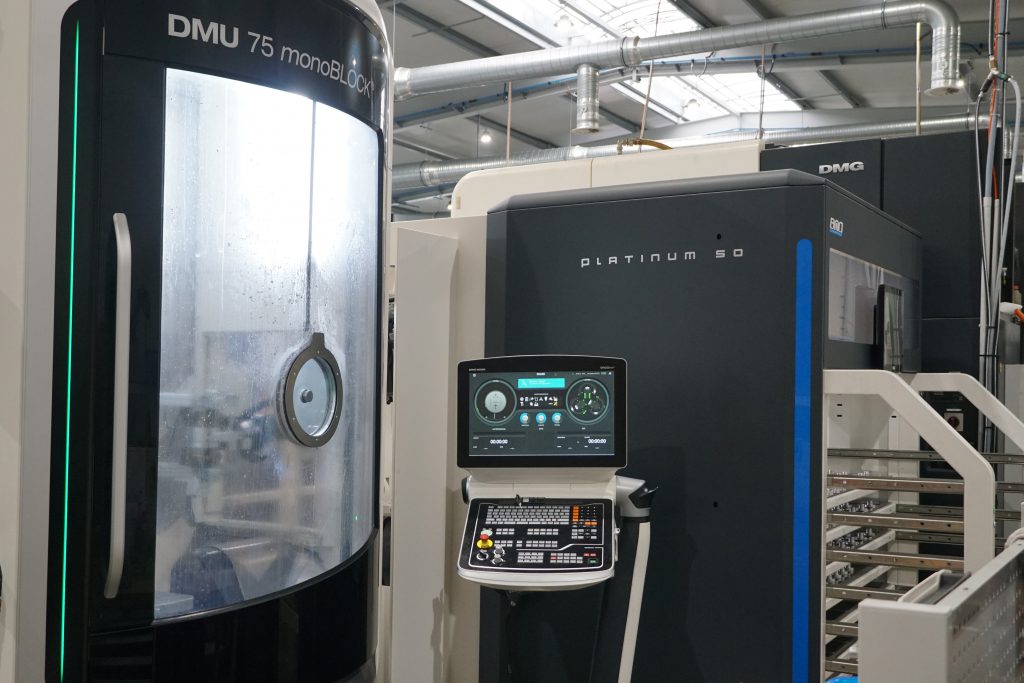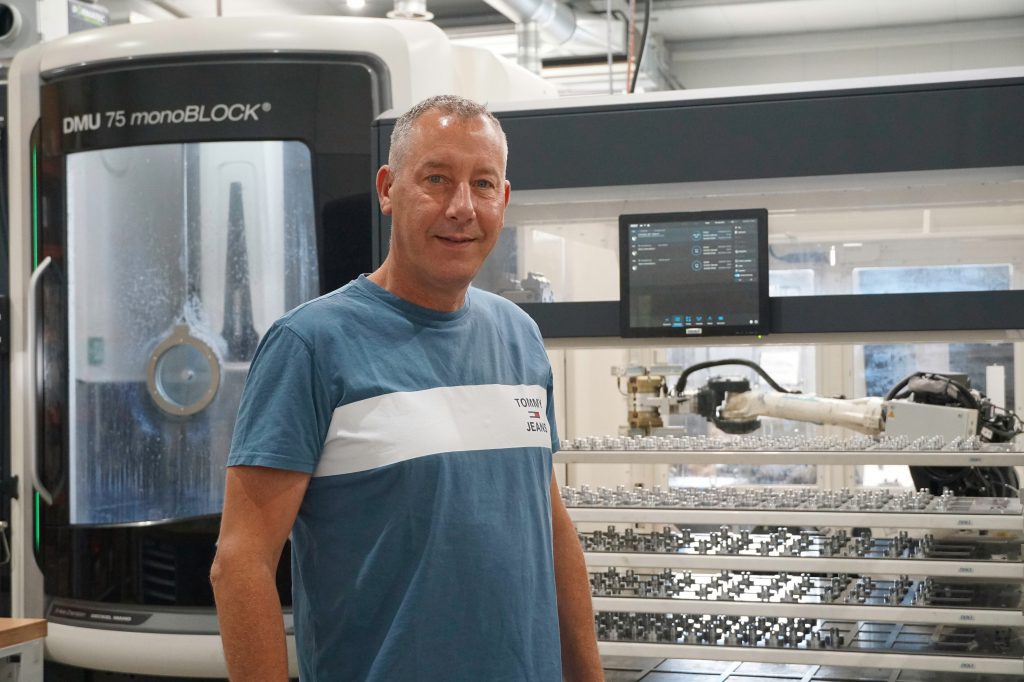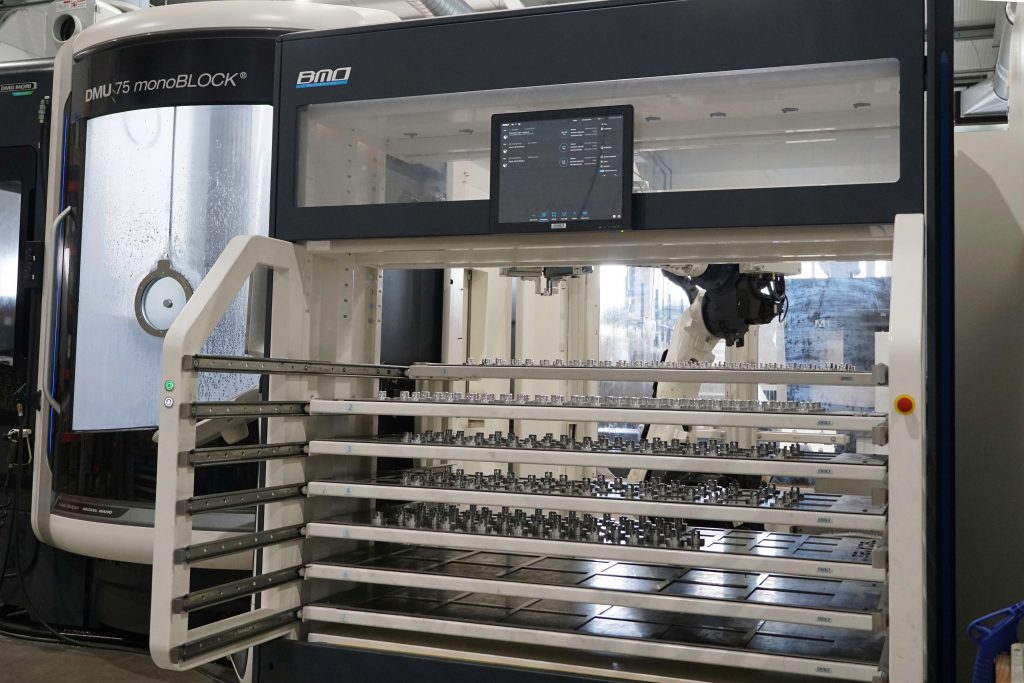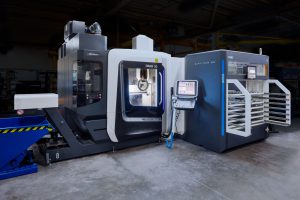Matec Maschinenbau (Eschweiler, Germany) opts for flexible automation with BMO robot cell
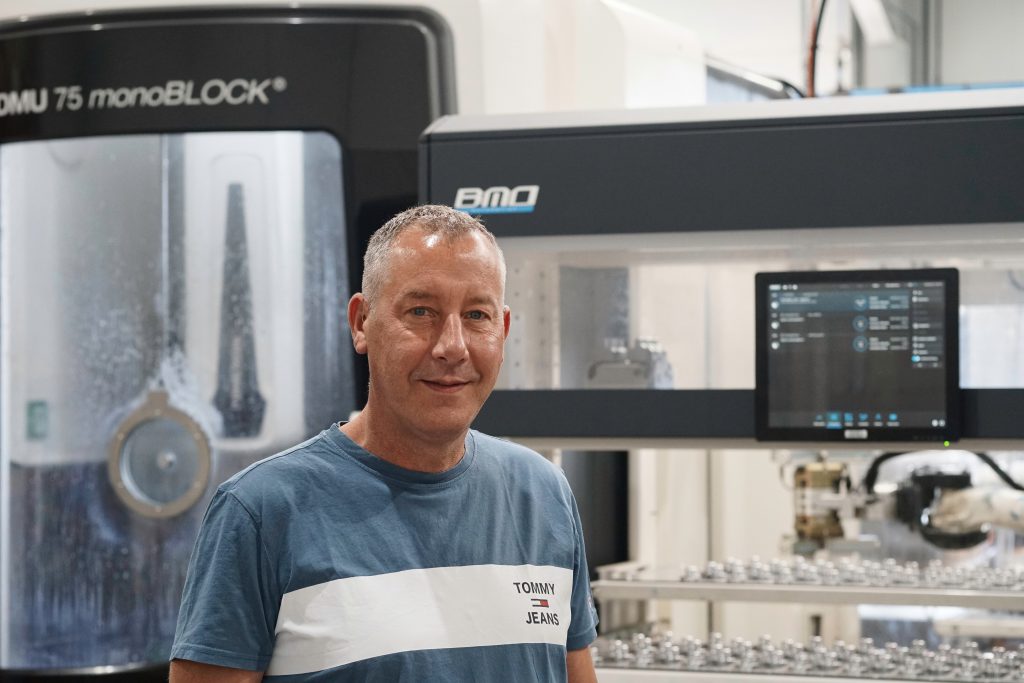 In the first year that BMO Automation’s Platinum 50 robot cell took over loading of a 5-axis machining centre at Matec Maschinenbau, the new machine’s spindle ran for 4,500 hours. Chip-to-chip time. That is five to six times what it would have been if the Eschweiler-based subcontractor had loaded the machine by hand in two shifts. ‘Automation is a building block of a future-oriented approach,’ says Rene Ohlenforst, one of the two owners. To achieve this high productivity, though, as a machinist you have to master the whole process.
In the first year that BMO Automation’s Platinum 50 robot cell took over loading of a 5-axis machining centre at Matec Maschinenbau, the new machine’s spindle ran for 4,500 hours. Chip-to-chip time. That is five to six times what it would have been if the Eschweiler-based subcontractor had loaded the machine by hand in two shifts. ‘Automation is a building block of a future-oriented approach,’ says Rene Ohlenforst, one of the two owners. To achieve this high productivity, though, as a machinist you have to master the whole process.
Matec Maschinenbau in Eschweiler is a typical contract manufacturer, a ‘jobber’, machining precision components and building complete modules for clients in a variety of industries. In 2001, Rene Ohlenforst and his partner Lars Dick started with one CNC machine. Today, in 2022, they have some 35 CNC, EDM and grinding machines and measuring systems – everything a modern subcontractor needs to meet ever-increasing demands. Two years ago, the business partners built new company building. The roof is covered with solar panels. ‘During the summer we are completely self-sufficient in terms of energy,’ tells Rene Ohlenforst proudly. In his view, as a machining subcontractor thinking about how to become more sustainable is part of the business. Just as they have thought about how to future-proof themselves as a subcontractor.
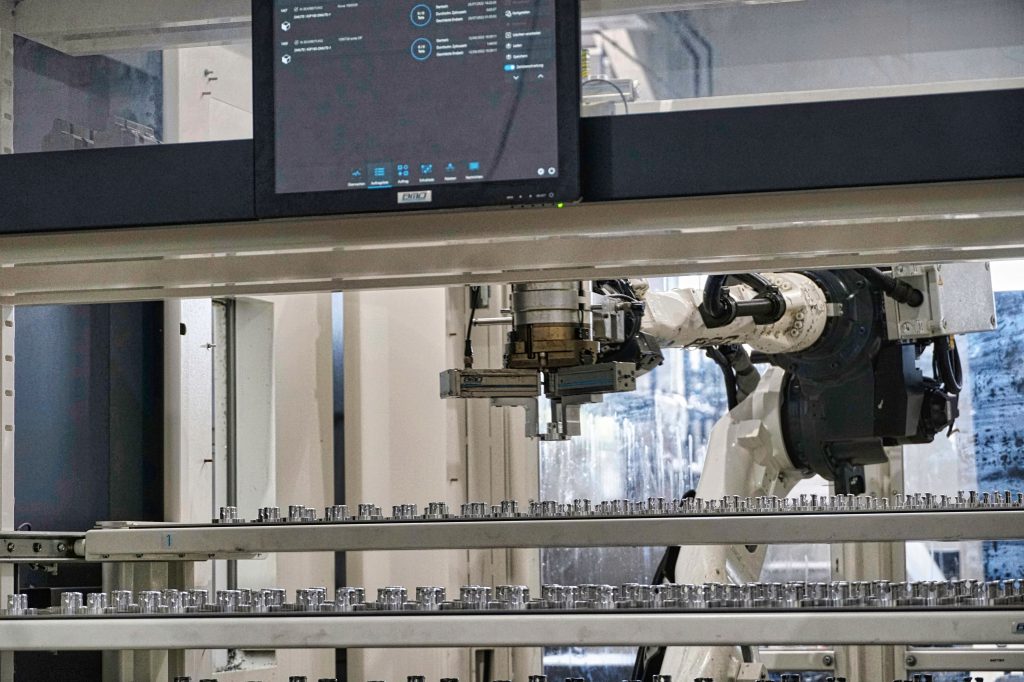
Unwarranted anxiety
BMO Automation convinced him that the Platinum robot cells allow you to automate flexibly, without the need for employees to have specific knowledge of robotics. Because that was his big fear beforehand: does the technology do what is promised or is it simply too complex? ‘Programming is so simple that even our apprentices do it.’ For Rene Ohlenforst, therein lies the strength of the automation developed by the Dutch supplier. All the know-how to get the robot to make the right movements is integrated into the controller, so all the operator has to do is enter a few numbers.
‘A full day of practical training is included as standard. BMO Automation noticed our hesitation and offered to extend the number of training days to five, one of which was a month before delivery. As it turned out, we didn’t even need the extra five; the robot cell was running after just three days. Then all we had left to do was a little fine tuning.’
Demand continues to grow
Because, as the two owners of Matec Maschinenbau recognise, the market is changing. Demand for high-quality precision components is growing, and will continue to grow in the coming years, Rene Ohlenforst expects. ‘Clients are really starting to think about bringing back production from the Far East because they want higher delivery reliability.’ But they are looking for flexibility from the subcontractor. And the costs must be competitive with low-wage countries, despite the fact that in German industry, labour costs continue to rise. At the same time, the subcontractor notes it is becoming increasingly difficult to find skilled workers; even apprentices are difficult to persuade. ‘The challenge is: how do we become more productive? How do we increase productivity and reduce costs,’ summarises Rene Ohlenforst.
“‘Without automation, you wonder how someone else can make the part for that money.’
Rene Ohlenforst, Matec Maschinenbau
Robot cell offers flexible solution to increasing demand
Matec Maschinenbau has found the answer in the Platinum 50 robot cell from BMO Automation, the Dutch manufacturer of flexible robotic loading systems for CNC machines that make unmanned Multi Batch production possible. A year ago, Matec Maschinenbau paired this Platinum 50 cell with a DMG MORI DMU 75 monoBLOCK 5-axis machining centre, which they purchased at the same time. As the Dutch supplier’s Platinum cells are suitable for loading two CNC machines as standard, BMO Automation also paired an already slightly older DMG MORI 70 eVolution to the robot cell. The result of this investment? ‘A smile on the faces of the machine shop owners,’ beams Rene Ohlenforst.
‘Within four weeks, the production cell was running like a Swiss watch. Our anxiety over the robot technology was completely unwarranted.’ In its first year, the DMU 75 monoBLOCK ran around 4,500 spindle hours. ‘Chip-to-chip time,’ the machine shop owner adds for clarity. He estimates that the number of spindle hours is five to six times higher than average for a subcontractor working in two shifts.
‘By automating, you win more than the third shift in a day. We now run almost unmanned at the weekends. And we don’t have daytime machine downtime when the employee takes a toilet break, gets coffee, is working on a new program or falls ill.’ By that, Rene Ohlenforst does not mean any disrespect towards his machinists, whom he values immensely. He understands that an employee may have a quick chat with a colleague while getting coffee. ‘Our employees are not robots. Humans cannot possibly sustain the takt time of a robot.’
Willy helps make flexible production possible
Willy. That’s what employees call BMO Automation’s robot cell. Rene Ohlenforst believes it is important that employees see the robot cell as working side-by-side with them, like a colleague. The Platinum 50 cell combines product handling with pallet handling. Matec Maschinenbau uses the latter feature on the DMU 75 monoBLOCK for changing clamping blocks. The BMO controller calls the shots: it decides which NC program to use and then controls the robot and machine to change the fixture if necessary. BMO Automation calls this approach Multi Batch. During the weekends the robot cell runs completely unsupervised to complete several orders, with series sizes ranging from 50 pieces to many hundreds. Both rectangular and round materials are machined interchangeably. ‘BMO helps us achieve what we could not do before, namely produce very flexibly,’ the machine shop owner says.
Child’s play software
The BMO software on the cell is easy to operate: The intuitive menu makes it child’s play for the operator to prioritise a rush order. This form of automation not only increases production but simultaneously improves delivery reliability. ‘If a customer calls on Monday and needs 300 products on Friday, we can be sure the order will be ready on Thursday. Without automation, you can schedule such a rush order, but if the employee goes home sick the day before delivery, you have to disappoint the customer.’ Matec Machinenbau mills the somewhat larger series on the DMG MORI DMU 70 eVolution.
As this machine has just two channels through the table, fixtures cannot be changed automatically. As a result, they are limited in the sizes they can produce on the DMU 70 eVo on a continuous basis, which is why they opt to run the larger series on this machine. One factor that makes the high productivity possible is that the machine no longer stands still while employees are programming a new workpiece. The Eschweiler-based subcontractor uses a mix of CAM programming and programming on the machine. This is because it is important that CNC operators continue to develop their skills. Before both machines were automated, the spindle would no longer be producing while a new workpiece was being programmed. Now the machine continues to run, and the robot handles the loading while the machinist works on a new program.
Importance of process control
‘Automation is a building block of a future-oriented way of working,’ says the business owner. He compares it to the introduction of the first CNC controllers. Companies that did not keep up with that development and stuck to conventional machines can hardly compete today. ‘Without automation, one day you would find yourself no longer able to compete with companies where the machines run 24/7. Then you would find yourself wondering how others can make a part for €3.50 while you have to charge €6.00.’ The solution, however, involves much more than just installing a robot. The reason Matec Maschinenbau was able to run 4,500 spindle hours on the new DMU 75? In the first year the subcontractor already had a firm grip on every facet of the process. Because only then will both the first and last part of a batch be equally precise.
This process control requires skilled machinists with knowledge of the process as well as the right preconditions, such as climate control in the production hall and high-quality CNC machines with all the options installed that are necessary to effectively monitor the process. Matec Maschinenbau, for example, chose the tool magazine with 200 positions. And tool monitoring with a laser system and accurate touch probes to measure the part in the vice.
Cleaning Station
They also chose the cleaning station that BMO Automation offers as an option with the Platinum cell. The Eschweiler-based subcontractor was the first in Germany to use it. Rene Ohlenforst says, ‘After the robot changes the piece and the machine is running again, the previous piece is rinsed and the coolant is blown off it. Pieces go into the rack clean and dry, so we don’t have any stains or dirty pieces after the weekend.’ Not cutting any corners on equipment and ensuring control of the complete process. That is the key to success for Rene Ohlenforst. And as a precision machinist you will have to do that yourself, he says.




